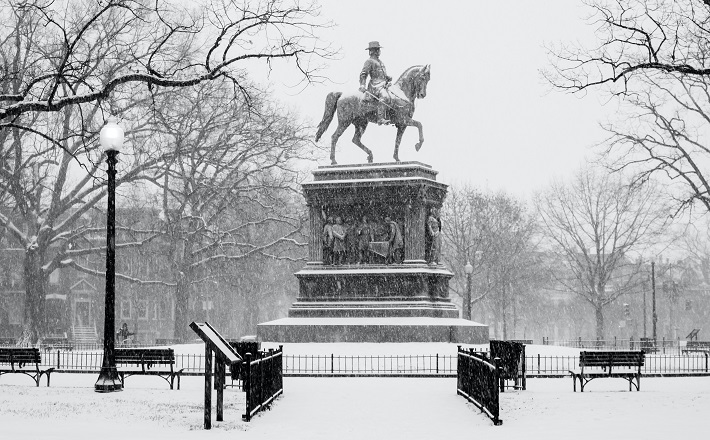Ask any preacher to name the most challenging days to preach, and national holidays will surely be near the top of the list. Whether preparing for Sunday worship with their own congregations on or near a national celebration or serving as guest speaker for a community service, preachers face difficult questions about just what and how much to say. While it has always been challenging to navigate the relationship between our Christian and national identities, the current political polarization that characterizes our communities and churches alike has made that challenge almost insurmountable.
Some preachers handle the challenge of addressing national celebrations by avoiding any mention of them entirely in worship. While that might be acceptable for some congregations, others expect at least an acknowledgement of national days, whether by way of a prayer or hymn or sermon illustration. The reality is that something within us as human beings seeks markers to define the passing of time. Along with liturgical days such as Christmas and Easter and personal celebrations such as birthdays and anniversaries, national days serve as such markers. And since we as Christians acknowledge that we are citizens of both the kingdom of God and a particular nation, it is understandable that congregations expect preachers to help them live into the responsibilities and privileges of that dual identity.
Given the reality that all preachers will at some time be called upon to offer a word from the Lord on the occasion of a national celebration, what, then, shall we say? Preachers can begin by giving serious thought to the occasion addressed and those who might be gathered for worship.1 With the occasion and listeners in mind, preachers can then navigate the challenges and discover the opportunities inherent in preaching on national holidays.
Challenges of preaching national holidays
- Addressing national days can easily veer (or be perceived as veering) into “political preaching.” Finding common ground, perhaps in the original intention of the day, can help to bridge ideological differences among the listeners.
- Not all listeners, no matter how monolithic a congregation or gathered group appears to be, will have the same regard for national days. Age, political affiliation, ancestry, as well as life experiences will shape how listeners feel about the day.
- Some listeners will expect significant attention to be given to national celebrations while others will resist on the basis of separation of church and state.
Opportunities of preaching national holidays
Despite the challenges, preaching on national holidays offers opportunities to:
- Acknowledge that ALL our days are lived in the presence of God and under God’s care.
- Strengthen ties to our neighbors, communities, and nation as we seek ways to work for the common good.
- Gain new perspectives on traditional understandings of national days, including those who have been excluded from the story and those who suffered because of it.
Three national holidays will occur over the next few months in the U.S. context in which I live. Here are some thoughts for addressing those days:
Preaching Veterans Day
- Anticipate a mixed gathering of listeners (especially at a community celebration). Those gathered probably will include active and retired military personnel and their family members BUT ALSO some who are or were anti-war activists, protestors, and even conscientious objectors.
- Recapture the original name and intention of the day. The day was first declared as “Armistice Day,” marking the end of World War I. Common ground for addressing the day might be found in the original name and intention of the day: the laying aside of arms and the pursuit of peace.
- Remind listeners that who we are and what we have are the gifts of those who have gone before us. The freedom and abundance many of us enjoy in our nation came at a price. In response, we are called to honor and care for those who paid that price.
- Recommit to God’s intention for us to “seek peace and pursue it” (Psalm 34:14). Regardless of ideological or political convictions, God wills peace for all people and nations.
Preaching Thanksgiving Day (U.S.)
- Be mindful of those who bring different “stories” to the day. It may be easy for European descent preachers to slip into the traditional “Pilgrims at Plymouth Rock” interpretation of Thanksgiving, but many listeners will find that story exclusive and even painful.
- Help listeners discover an “attitude of gratitude” for blessings that surround them and respond with acts of generosity.
- Remind listeners that God is the giver of all good gifts.
- Consider lectionary texts appointed for the day. Most lectionaries (including the RCL) suggest texts for Thanksgiving Day.
Preaching Martin Luther King, Jr. Day
- Consider who might be among the listeners and what the day means to them. As my colleague and I stress in our book (footnoted below), thinking about who might be listening on a special preaching occasion is critical to shaping the message. That is particularly critical on MLK Day when listeners of different races will approach the day from different perspectives.
- Try to capture the bittersweet feelings evoked by the day. While the day is meant to celebrate the work of Dr. King and all who have fought for civil rights, it also calls us to acknowledge the pain endured on the road to equality and how far we have yet to travel on that road.
- Connect the lectionary readings for the day preceding MLK Day to the mission of Dr. King. Themes of call, God’s faithfulness, resistance to evil, and the appropriate use of our spiritual gifts are among the texts for the day.2
National holidays are occasions for remembering the abundant gifts given to us as a nation and citizens within it, but just as importantly they are occasions for mourning the price paid for many of those gifts: the price in terms of lives lost, opportunities denied, injustices perpetuated, and landscapes scarred. Acknowledging national days in our worship and preaching helps us seek to do better as we move into the future with gratitude and recommit to living as “one nation under God.”
Notes
- See my chapter on “Holy Days and Holidays” in Beverly Zink-Sawyer and Donna Giver-Johnston, For Every Matter under Heaven: Preaching on Special Occasions (Minneapolis: Fortress Press, 2022), 115-40, for specific ways to think about preaching on national holidays.
- See For Every Matter under Heaven, pp. 131-32.

